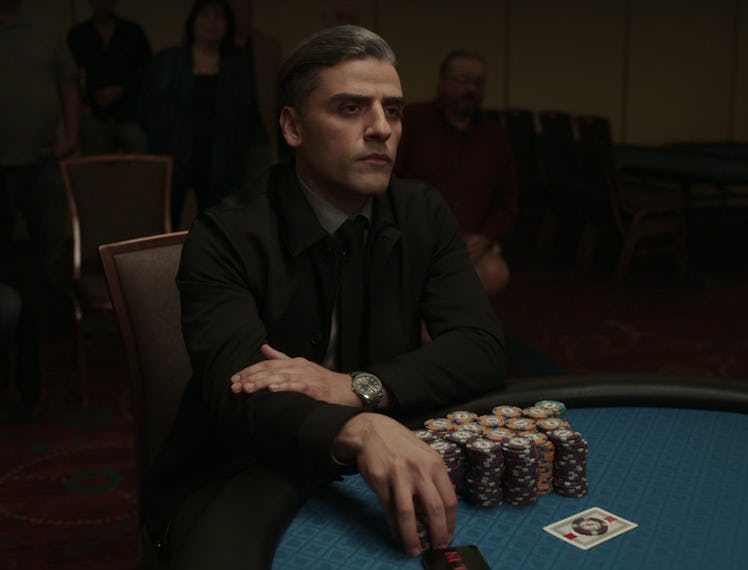The Card Counter Lets Oscar Isaac Smolder in Solitude
This fall, the media has focused on Oscar Isaac’s electrifying chemistry with fellow actors during his high profile red carpet appearances, but on-screen in The Card Counter he smolders in solitude with a low-key, sleep-deprived stoicism.

From a capsule description of The Card Counter, you might expect Oscar Isaac playing a gambler to be a seductive prospect. The truth is that the movie—which opened last weekend following a world premiere in Venice—holds more than a few surprises up its sleeve. For one thing, it’s one of a few dramas that reckon with the trauma of Abu Ghraib in a genuinely unsettling way (which feels like the only way to do so). That fact alone might not be on the radar of anyone tracking Isaac’s high-profile fall appearances, which include the sobering HBO miniseries remake Scenes from a Marriage—opposite Jessica Chastain—and the seemingly inescapable science fiction action saga Dune. But there’s a reason Isaac’s character, William, single-mindedly devotes himself to poker, and it’s not the money—it’s the oblivion.
William joins a long line of “God’s lonely men” envisioned by filmmaker Paul Schrader, the director of First Reformed and American Gigolo and, still most indelibly, the screenwriter of Taxi Driver. Hollowed out by guilt and embracing solitude like a religion, William haunts casinos and sits at game after game, only to retire to empty rooms to write in his journal. He appears to keep afloat, barely, until one day a gambling industry pro decides he could be doing better. Confident of his potential, La Linda (Tiffany Haddish) recruits William, bankrolling his entry into high-stakes poker tournaments.
At a certain point on the plot’s road to a climactic championship game, La Linda notices her client, beyond a canny professional interest, and here’s where Schrader makes a fairly audacious choice with his actors. He directs Isaac and Haddish—two differently electric performers—to underplay. For Isaac, that means reckoning with his character’s post-traumatic emotional shutdown—bravely steering clear of cool and aloof, landing somewhere closer to a sleep-deprived stoicism. Haddish turns in her own subdued performance, endowing La Linda with an unshowy confidence that comes from years of experience with games of chance. I remember reading that Schrader—who had seen Haddish in her stand-up specials and Girls Trip—asked her to take the music out of her voice, which is quite a thing to ask, but plays to the movie’s mood. (I haven’t even mentioned the oddball element of Tye Sheridan as a young man that William takes under his wing, despite the kid’s revenge fantasies toward a military contractor and Abu Ghraib veteran played by Willem Dafoe.)
The courtship between gambler and handler isn’t a sure thing, if you haven’t guessed: there’s a cringing false start when La Linda signals she’s interested, at some casino bar or other, and William tone-deafly replies with what sounds like a press statement about their friendship. He comes around eventually, but Haddish and Isaac perform that they definitely relate in a kind of level-headed, been-through-the-wars mode, where a mutual contentedness deepens slowly but perceptibly into something else. Their first kiss is that something else—a moment of abandon for La Linda. But it’s hard for that connection to break entirely through the buffer around William as a tragic character on a collision course with his own past. And I’m not sure the film wants it any other way.